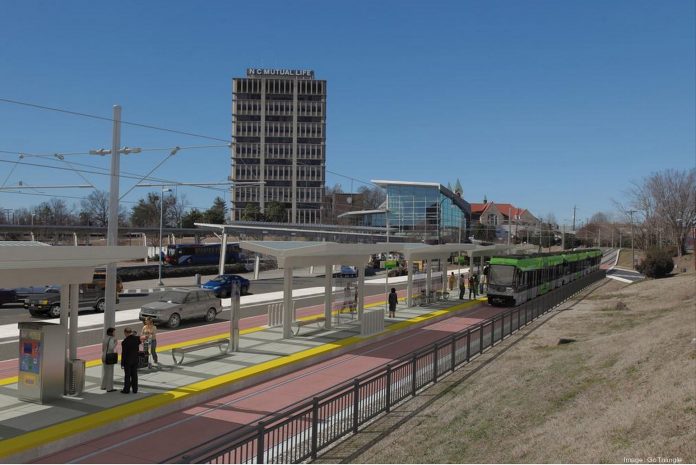
GoTriangle’s board of trustees have decided to end their long-planned $2.7 billion light rail project, following Duke University’s insurmountable opposition and other barriers to the massive transit infrastructure initiative.
The original plan, in the works for years, would have connected UNC Hospitals in Chapel Hill with Duke and other destinations along an 18-mile route. It would have also boosted the Triangle region’s construction economy significantly.
The decision is disappointing in light of the plans that Durham has made over the last several years for jobs, economic development, affordable housing and other benefits, the News & Observer quoted Durham Mayor Steve Schewal and Durham County Commissioners Chair Wendy Jacobs as saying.
“We are taking a huge hit. We’re giving up $1.25 billion in federal funding by not moving forward with this,” Schewal said. “There is no path forward.”
Duke University’s opposition, two state deadlines and escalating costs would have forced major cuts in the 19-station project, GoTriangle officials said.
The problems were “more complex than sometimes can be conveyed through the media,” board member Jennifer Robinson, a Cary Town Council member, was quoted as saying. “It’s just unfortunate that we’ve gotten to a place where the hurdles are insurmountable.”
GoTriangle general manager Jeff Mann said staff met with senior leaders at the Federal Transit Administration (FTA) in Washington in the week before the March 27 decision to kill the project. She said the FTA officials expressed significant concerns.
“The FTA let us know that (with) the continued uncertainty with Duke and N.C. Railroad and the additional environmental assessment needed for downtown Durham changes, as well as the need to secure additional funding, (it) is no longer practical for the Durham-Orange light-rail project to receive a full funding grant agreement by November,” Mann said. “Very low probability.”
In a statement the Coalition for Affordable Housing and Transit, Orange County Transit Advocates/NEXT Chapel Hill-Carrboro, Durham Congregations in Action and the Durham Housing Authority board said ending the light-rail project “represents a tragic loss for the Durham and Orange County communities.”
“The community advocates who have supported this light-rail project stand ready to work with our elected officials and GoTriangle in the necessary and continuing work to provide affordable, workable transit options for all of our residents, including those who work, reside or must travel to our region’s largest employers,” the statement said.
While GoTriangle officials found several cost savings – including $60 million by cutting the North Carolina Central University (NCCU) station – these weren’t enough to overcome the hurdles.
North Carolina General Assembly decisions cutting the state’s share of construction costs from 25 percent to 7.7 percent, and setting deadlines for getting federal funding, reduced GoTriangle’s ability to respond to changes and new FTA requirements, board of trustees members said.
The region “should not forget that probably the biggest blow was the legislature hobbling us and challenging us to win the race,” Orange County Commissioner Mark Marcoplos said.
Other challenges included:
- An additional $267 million in costs, including for a downtown bridge, underpass and tunnel system in Durham;
- N.C. Railroad Company concerns that have delayed agreements;
lagging public and private fundraising; and - a looming eminent domain battle for Duke University’s land, following its rejection of a cooperative agreement.
GoTriangle will continue to collect the half-cent sales tax and portion of car registration and rental fees to fund light rail and other transit improvements. These funds will be available for other plans, Marcoplos said.
“We will be quickly working on a way to supplant what the light rail might have done for us to the best of our ability considering that the light rail was well studied and was the best solution for our problem, but we have other options and a commitment to provide the best transit that we can,” the News & Observer reported Marcoplos as saying.
Earlier, Duke University officials say they decided to reject the GoTriangle proposal because of concerns about how the project will affect their medical and research facilities on Erwin Road. Duke believes the concrete barriers on the track might provoke hazardous conditions for ambulances, while the noise, vibrations, and construction work from the train could upset patients at Duke Hospital.
The New York Times reported that Democratic state representatives were shocked by Duke’s decision, criticizing the elite university and its officials for being “out of touch” with the community’s needs, particularly for lower-income residents. Durham’s former mayor Wib Gulley reportedly compared the situation to a time in 1969 when Duke urged police officers to “gas and beat students” amid civil rights protests.
GoTriangle had estimated that the transit line would support roughly 20,000 new jobs for Durham and carry more than 26,000 commuters per day.
Duke said “no” even after GoTriangle CEO Jeff Mann and Ellen Reckhow, chair of the GoTriangle Board of Trustees wrote to the university asking them to agree to mediation.
“The lack of cooperative agreement with Duke creates significant challenges for the Light-Rail Project, effectively nullifying two decades of work,” the letter read, as reported in the News & Observer.
“Unfortunately, Duke’s concerns and requests for consideration of alternate routes – which have been stated in almost identical form since 1999 – were ignored, minimized, or redirected,” the university’s leadership responded in their letter.
